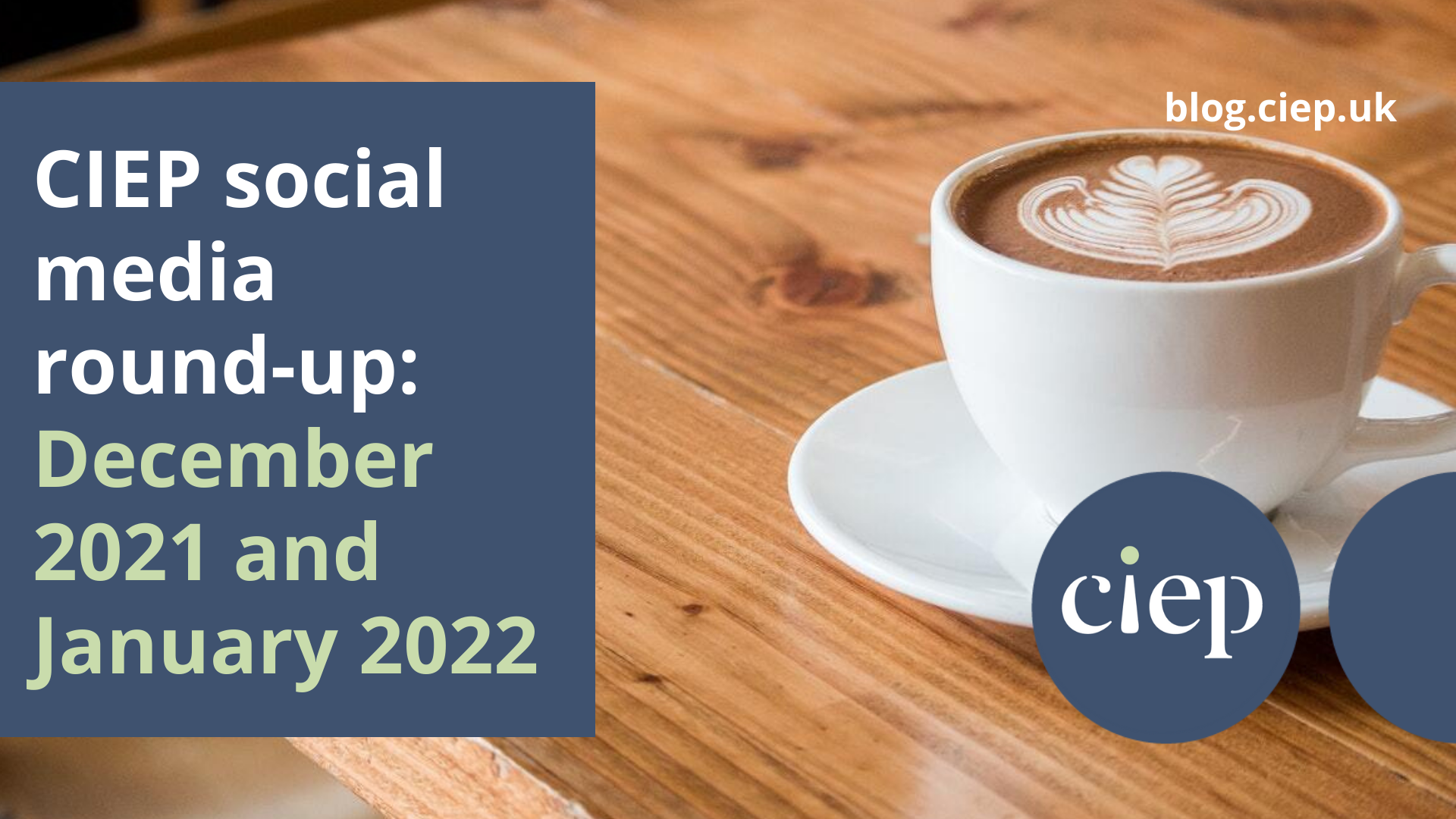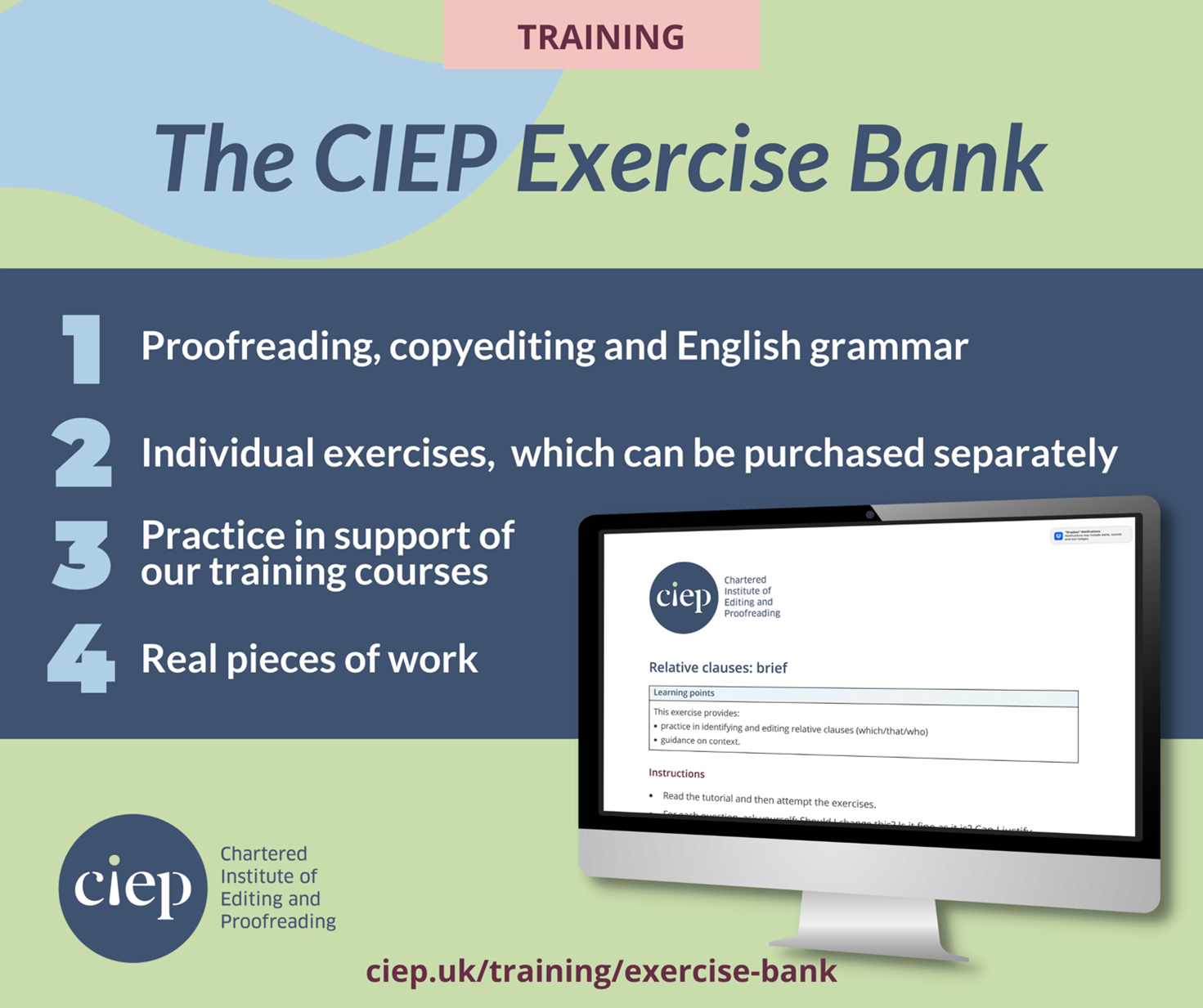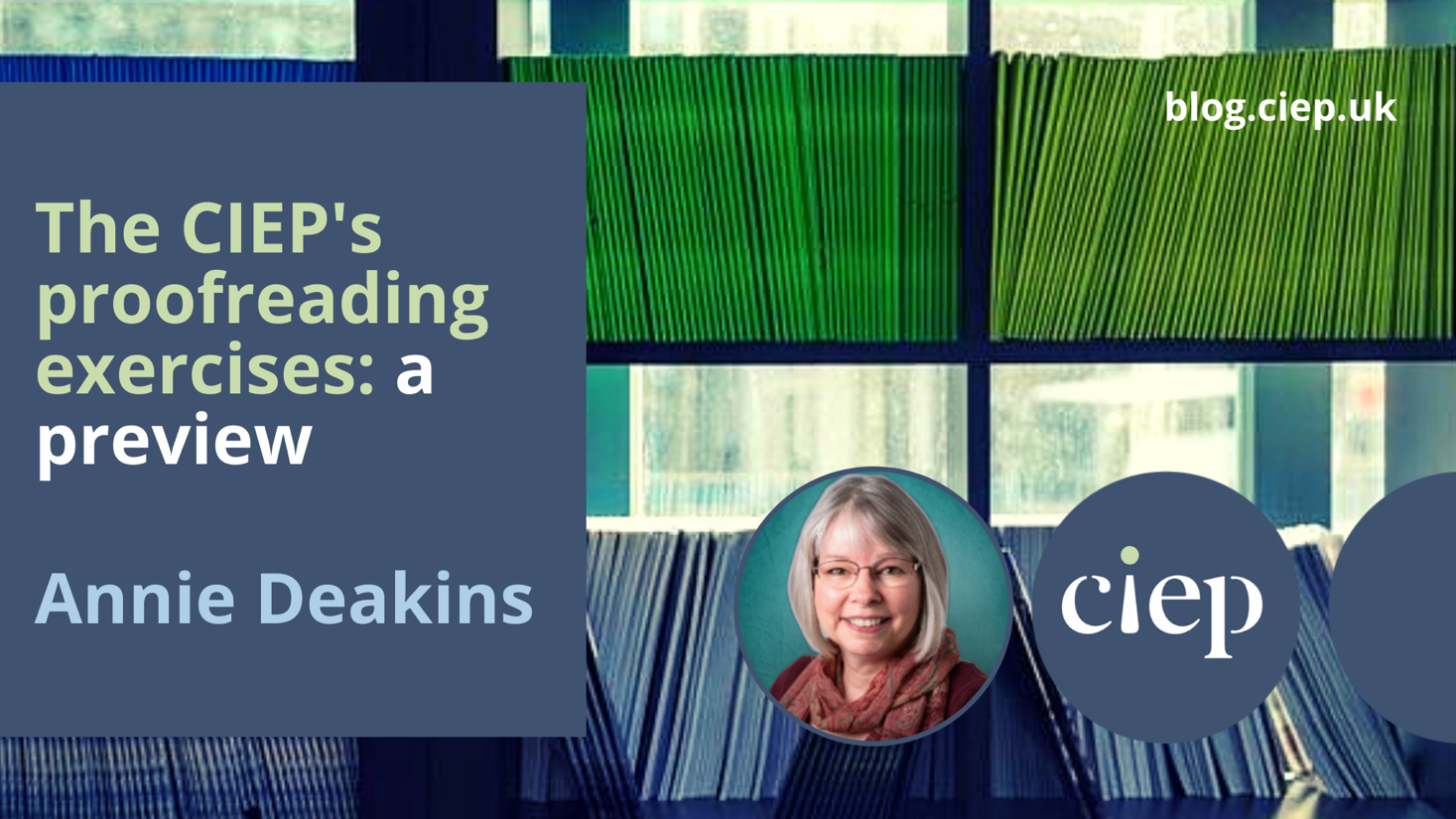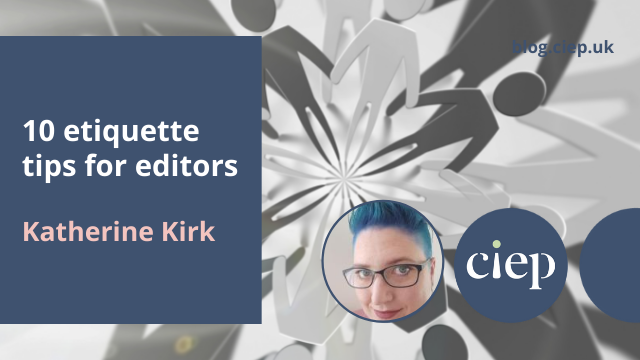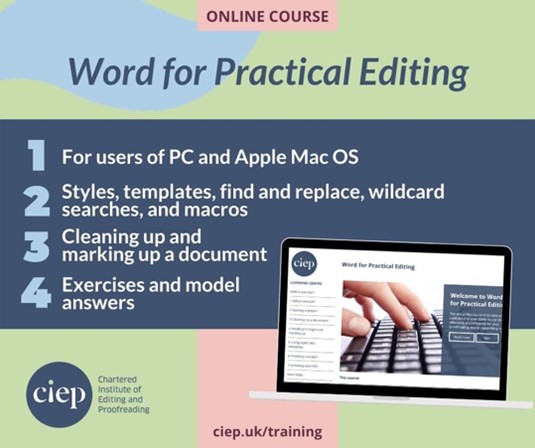In our review of December 2021 and January 2022 we’re focusing on our friends and followers, as their feedback and chat was particularly entertaining during these two months. We gave something back to them, too, with a festive offer of a stonking 30% discount on CIEP courses.
In this follower-focused round-up:
- Cantankerous creatures, plus coffee and cheese
- Negotiating new words
- Course enrolment stampede
- Newsletters and new blogs
- Gems from the archive
- New year, new theories
- Chatting among yourselves
- Laughing at words
- Signs of the times
Cantankerous creatures, plus coffee and cheese
There was a wide range of fun content to share in early December, from words to describe being irritable (illustrated with excellent photos of domestic creatures, wildlife and small children looking annoyed) to the question of whether the way you write runs in your family. ‘I think there is something to this’, replied an author on Twitter, whose son ‘writes in a very similar style but on completely different subject matter’. It was great to hear this view from a real-life writer in the absence of the Brontës, the Amises, and AS Byatt and Margaret Drabble to tell us what was what.
On 8 December we got our friends and followers to imagine what would happen if they knocked over their morning coffee as they leant over to consult their copy of Butcher’s Copy-Editing. With the spillage could they, like artist Giulia Bernardelli, create a picture of Botticelli’s Venus or the Eiffel Tower? One follower responded that they would more likely rescue their copy of the book (it’s not cheap), and another added: ‘Stuff the coffee – save Butcher’s and the computer!’ Over on Facebook, another editorial professional looked at a coffee-stained image of Madrid and commented ruefully, ‘Actually, my copy of Butcher’s is starting to look a bit like that …’
By 10 December we were turning our attention to the upcoming holiday season. We posted a @twisteddoodles cartoon entitled ‘Christmas food shopping’, with two excited-looking people in a supermarket having a conversation: ‘Instead of cheese let’s buy the “fancy cheese”.’ ‘Let’s buy a lot of cheese for no good reason.’ This certainly brought a lot of cheese lovers out of the, er, cupboard? Fridge? One follower confessed, ‘I have been told not to buy “too much cheese” on Christmases past. But can there be too much cheese?’ The responses came: ‘never!’ and ‘no, there can never be too much’. That’s that settled, then.
Negotiating new words
Sometimes our postings on new words and new definitions of existing words don’t cause too much of a stir, as with ‘A little birdie told us that it’s time for the OED December 2021 update’. This quarterly update included 750 new entries, ‘and almost as many fully revised entries’, with an emphasis on the bird kingdom. As ever, hats off to the OED team who try to cram in as many references to their new entries as possible in these updates.
However, not a week later, Cambridge Dictionary’s new words for 20 December 2021 were released. They included ‘resimercial’: ‘A resimercial office combines elements of “residential” and “commercial”, with comfortable furniture and design that makes it look more like a room in a home.’ We canvassed opinions: ‘We’re not sure we have the stomach for “resimercial”. What do you think?’ One response came in, short, sharp and unequivocal: ‘“Resimercial”? No.’ Oh. Well, luckily it’s not in the dictionary. Yet.
A month later, Cambridge’s new words prompted a similarly decided response. Encountering ‘clean inboxer’, ‘someone who reads and takes action on every email they receive when they receive it, so that there are never any unread emails in their inbox’, we wondered who these people could possibly be, and tentatively asked, ‘Are there any clean inboxers out there?’ Our call was answered by a single person, on Twitter, who offered a brief ‘Yes, big time.’ There’s someone who gets to the point, which probably explains the excellent standard of their email hygiene.
Course enrolment stampede
During December we launched a festive offer. We thought 30% off CIEP courses would rouse some interest, but even we hadn’t anticipated the massive response. During the week of the campaign in December we sold 470 courses, with many people buying more than one to set up their CPD for the year ahead. Enjoy all that learning, you editing and proofreading boffins!
 In January we launched the CIEP Exercise Bank, to give editors and proofreaders real-life practice and confidence. Annie Deakins, who tested and proofread the bank, blogged about it for us.
In January we launched the CIEP Exercise Bank, to give editors and proofreaders real-life practice and confidence. Annie Deakins, who tested and proofread the bank, blogged about it for us.
Newsletters and new blogs
Did you know that all of our social media accounts have the sign-up details for Editorial Excellence, our external newsletter, pinned to the top of the page? When you join you get a welcome email pointing you to the newsletter archive so you don’t have to wait for the next edition.
 Editorial Excellence, and our member newsletter The Edit, are full of the latest blogs by our members and friends, and some classics from the archive. There was an abundance of new blog posts in December and January, including: ‘Good communication is accessible’ by Sue Littleford; ‘What’s your favourite phrase or saying?’ by the CIEP wise owls; ‘The CPD in the work we do’ by Abi Saffrey; ‘Curiosity or destiny? The different routes to the CIEP’ by Alex Mackenzie; ‘Context is everything: How learning a new language shed light on my editing practice’ by Julia Sandford-Cooke; and a blog by Katherine Kirk about Jennifer Glossop’s top-ten etiquette tips for editors, shared recently with the Toronto CIEP group.
Editorial Excellence, and our member newsletter The Edit, are full of the latest blogs by our members and friends, and some classics from the archive. There was an abundance of new blog posts in December and January, including: ‘Good communication is accessible’ by Sue Littleford; ‘What’s your favourite phrase or saying?’ by the CIEP wise owls; ‘The CPD in the work we do’ by Abi Saffrey; ‘Curiosity or destiny? The different routes to the CIEP’ by Alex Mackenzie; ‘Context is everything: How learning a new language shed light on my editing practice’ by Julia Sandford-Cooke; and a blog by Katherine Kirk about Jennifer Glossop’s top-ten etiquette tips for editors, shared recently with the Toronto CIEP group.
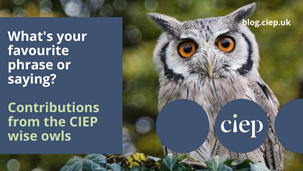

Gems from the archive
We reposted some great classic content in December and January. Blogs included pieces from Robin Black on why a professional editorial website encourages clients to pay professional fees; Luke Finley and Laura Ripper on plain English; and Kia Thomas on scammy and cautious editors. On which note, we reminded members of our fact sheet ‘Negotiating business contracts’, which helps you understand contract provisions and ways to negotiate the best possible outcome. CIEP members shared on video why CPD is important, and we reminded people about the CIEP Directory where top-notch editorial professionals in all specialisms can be found. We also promoted our popular course Word for Practical Editing, plus old quizzes and new. If you’ve missed any of the fun CIEP quizzes, you can find them on our website.

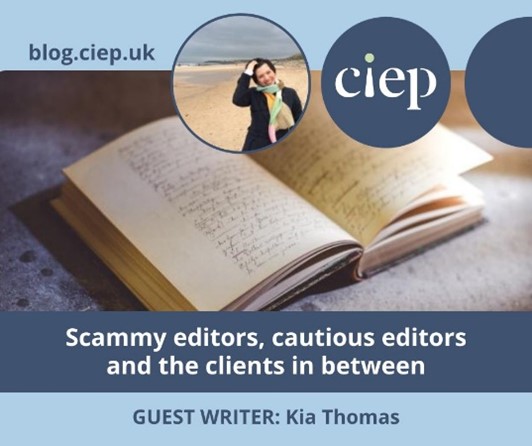
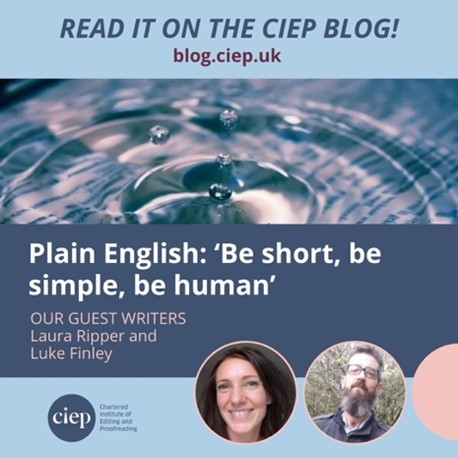

New year, new theories
In January our followers were back from their break refreshed and in the mood to respond to the latest scientific ideas on language. In ‘Our emotions and identity can affect how we use grammar’, Professor Veena D. Dwivedi explained how ‘emotional context affects how we understand and use language at the neural level’. Our LinkedIn followers were completely there for it: ‘I agree. Language usage, including grammar, has everything to do with social identity. Fantastic article!’ ‘Totally connect with this idea!’
A couple of weeks later we posted an article suggesting that dogs can detect differences between languages, which again drew interest and comments. ‘Fascinating!’ declared our followers, and one remarked: ‘This is true of cats too. Our cat responds to commands from me in English and my partner in Spanish. (Though being a cat, only when she feels like it!)’
Chatting among yourselves
Burns Night on 25 January was an occasion for a good old chit-chat. Immediately we posted an article from The Scotsman, Facebook responses went wild: ‘Lang may yer lum reek!’ (translation: ‘Long may your chimney smoke’); ‘It was always a big deal in my family!’; and, in response to a direct tag and question, ‘are you celebrating tonight?’, one follower responded: ‘OMG! I forgot! I usually have a gathering to read Burns’s poetry with haggis, neeps and tatties, sausages for the faint of heart. Thank you for the reminder. Must get shopping.’ We hope you got the Burns Night you’d planned. Or hadn’t planned, in fact.
Laughing at words
In the social media team we like to make people laugh, and often the content just goes ahead and does our job for us. This was the case with an article by Susie Dent, ‘From respair to cacklefart – the joy of reclaiming long-lost positive words’. A follower on LinkedIn testified, admirably using many of the words from the piece, ‘This article made me LAUGH OUT LOUD … I had to wipe the tears from my eyes with my snottinger, decided to stop being so crumpsy, and am making plans to visit my grandkids to feel some gigil. Words are so much fun.’
We got a great response with other long-lost words in Merriam-Webster’s list of polite words for impolite people, as followers and friends recalled their mums or grandmas calling them ‘flibbertigibbets’. Finally, apt for January, we posted Dictionary.com’s list of contronyms – words that have two opposite meanings – like cleave (to separate and also to adhere closely) and overlook (to not notice and also to supervise). LinkedIn followers responded: ‘I had a good laugh this morning over some of these’ and ‘Love this. I now know things that I didn’t realise I knew before.’
Signs of the times
This time last year most of us had never uttered the word ‘omicron’, which might explain the trickiness of the word the first few times we did say it in November and December 2021. We posted a couple of articles exploring how to pronounce it and why it was so difficult. In terms of the latter, it was partly because we are so used to words that start with ‘omni’.
And then, charmingly, the wordle, sorry, the world divided into those who know and love the word game Wordle, and those who don’t. An 11 January article giving some linguistics-based Wordle tips from David Shariatmadari provided some of our followers with the opportunity to express their love for the game, from ‘I am hooked’ to ‘I LOVE Wordle … I love the way it makes you think about how words are built’. But then in response to another Wordle article later in the month, another follower confessed, ‘I still have no idea what a wordle is …’ and got a ‘me neither’ in response.
On 14 January, content creator and marketer Emily Coleman (@editoremilye) commented on Twitter, ‘Wordle is the sourdough starter of Omicron.’ At the time of writing, that tweet has attracted 90K likes, 8,213 retweets and 983 quote tweets, most of which, it seems, said something like ‘What would your 2019/2020/summer 2021 self have made of this sentence?’ And that’s the inexorable march of language, friends. Who knows what new, old-but-obscure or just obscure words we’ll all be casually using by the end of 2022? In the meantime, keep your words coming, by commenting and chatting on our social media platforms. We love to hear from you.
Don’t miss a thing in editing and proofreading. Follow us on Facebook, Twitter and LinkedIn.
 About the CIEP
About the CIEP
The Chartered Institute of Editing and Proofreading (CIEP) is a non-profit body promoting excellence in English language editing. We set and demonstrate editorial standards, and we are a community, training hub and support network for editorial professionals – the people who work to make text accurate, clear and fit for purpose.
Find out more about:
Photo credit: coffee by Jason Villanueva from Pexels.
Posted by Harriet Power, CIEP information commissioning editor.
The views expressed here do not necessarily reflect those of the CIEP.

